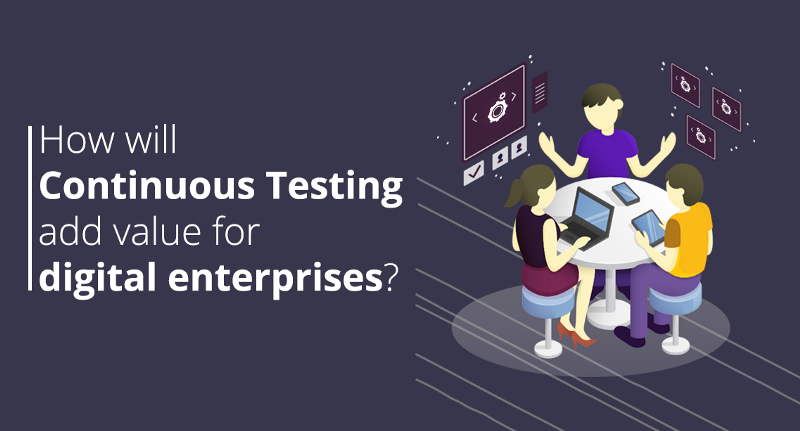
The challenges of digital transformation and changing market dynamics have forced business enterprises to scale up their development and delivery of software products. The advent of Agile paradigm has led to the faster development and deployment of software, a key yardstick for business enterprises to feel happy (and complacent).
However, while doing so, continuous testing is often overlooked or somehow given lesser priority. This approach can make the software more vulnerable from the perspective of security, quality and compliance. If such a software is deployed, it will result in quality issues as well as a bad user experience. In the increasingly competitive digital landscape of today, such an application can simply mean trouble for its makers.
To prevent such an eventuality and to ensure that quality is maintained at all levels of the extended SDLC (including deployment,) continuous testing needs to be brought to the centre stage. Furthermore, the emerging areas of digital technology such as Artificial Intelligence, Cloud Computing, Big data, Predictive Analysis, and the Internet of Things (IoT) need QA at the core of everything. Enterprises are realizing that Quality cannot be separated from development and deployment.
What is continuous testing?
In an Agile ecosystem, the fast pace of developing software did not quite match up to the sluggish pace of manual testing practices. This resulted in the minimum coverage of the test area and the subsequent prevalence of quality issues. This led to situations where organisations were forced to slacken the pace of development or testing, leading to inefficiency.
Moreover, since Agile deals with the streamlining of the development and Quality Assurance processes, the inefficiencies of the operations team are largely left untouched. This lacuna has an impact on the end user experience as any feedback on quality is not promptly addressed. This has led to the adoption of the DevOps paradigm.
Here, quality is not treated as a component of the development process alone, but of the whole SDLC and deployment stages. The emphasis in DevOps is more on adopting a holistic approach towards process improvement through test automation.
Adopting a continuous testing framework
Due to the built-in inadequacies of manual regression testing, the reliability and efficiency of end to end SDLC was questioned. To get over the problem, software testing across the development and delivery stages is made an integral component of DevOps. The objective is to identify the quality issues early on in the SDLC and mitigate them before releasing the code for the next stage. The iterative process of conducting continuous testing services across all stages needs a change in the culture of the organization as well.
Continuous testing services helps enterprises to bring in these benefits -
- Swift identification of quality issues across the build and deployment cycles
- Prompt resolution of user feedback leading to a better user experience
- Quick development and deployment of software into the market
- Executing successful digital transformation strategy, wherein an update to the software is done without impacting the user experience
- Better end user experience leading to a greater adoption of the software
- Software meeting the overall business goals as far as speed, quality, and efficiency are concerned
- Better realization of the ROI
Continuous testing framework and the need to change the mindset and culture
The embedded mind-set of business stakeholders and employees is mostly tuned towards achieving the production targets. However, with stringent compliance regulations in place, frequent release of the software without addressing the QA issues at all levels can be counterproductive. This calls for a shift in the mind-set of teams to treat quality assurance as an integral part of each and every activity of the overall SDLC.
Key features of continuous training services
- Risk mitigation with optimization of the test coverage area
- The quality assessment exercise takes the build to the next stage of the SDLC
- QA processes are aligned with the compliance mandate and business goals
- Optimization of testing leading to the elimination of rework
- Incorporate continuous QA into the organizational culture as part of the DevOps philosophy
Conclusion
The integration of continuous testing framework into the development and deployment processes of a business enterprise leads to the quick identification and elimination of quality issues. As the quality of software improves across the spectrum, the user experience follows suit. This helps the enterprise to retain customers and achieve ROI.
This article originally published at Medium.com – How Will Continuous Testing Add Value For Digital Enterprises?


- Agile Testing
- Artificial intelligence
- continuous integration
- Devops testing
- Digital Assurance Testing
- Digital Assurance Testing
- Digital Testing
- ERP testing
- functional testing
- IOT Testing
- load testing
- medical device testing
- medical device testing
- medical devices testing
- Mobile Testing
- performance testing
- performance testing
- performance testing
- quality assurance
- quality assurance
- Quality Engineering
- Regression Testing
- salesforce testing
- Salesforce Testing
- Security Testing